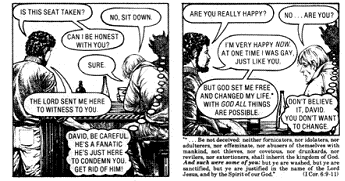Image: Christian tract, Jack. T. Chick.
I heartily endorse the New Atheists’ strategy of taking the firefight to the enemy’s doorstep. As someone who is truly soul-sick of his fundie relatives’ condescending, culturally arrogant prayers that he find The Light© before he’s cast into the lake of everlasting fire, I’m thrilled by the new strain of what might be called “evangelical” atheism. Watching Dawkins or Harris or Hitchens hand Christian apologists their heads is my idea of fun for the whole secular-humanist family, a popcorn-friendly bloodsport that’s as entertaining for the little ones as it is edifying. It’s high time those proselytizing god-botherers who materialize on my doorstep every Sunday morning understand what it’s like to have their beliefs treated as self-evidently absurd, the foundations of their world-view vigorously challenged by a devil’s advocate who gives no quarter. Spread the love, I say.
But Dawkins and Hitchens (both of whom I admire immensely as vorpal swordsmen in the Enlightenment cause, Hitchens’s intellectual glaucoma regarding the Iraq question notwithstanding) reveal an almost willful ignorance about religion as a social construction and American evangelical Christianity as a subculture.
Following cultural studies, ethnography, and cultural anthropology, I believe it’s important to understand the radically utopian impulses, unspoken yearnings, and unconscious desires that flicker through contemporary evangelical Christianity. Dawkins and Hitchens make short work of Christianity and all its bigoted, irrational works and ways, for which we owe them a debt of gratitude. But their analysis lacks subtlety, and their understanding of why so many are seduced by religion, especially in America, is millimeter-deep. To say that Christianity is a Bronze Age fable, a holdover from the primitive childhood of the species, may be deeply satisfying to those of us tending the Enlightenment flame in these new dark ages, but it’s also thumpingly obvious. Harris and Hitchens may be right, but they’re not terribly enlightening, at least to anyone not living on a flat earth, in a pre-Copernican cosmos.
Then, too, there’s the obvious problem that Dawkins is a humorless prig, as sanctimonious in his unbelief as true believers are in their faith. (I’m with Cartman on this one.) He’s on a Mission From God when it comes to prosecuting the atheist case—a one-man crusade so obsessively all-consuming it runs the risk of elevating his unfaith to a sort of faith. He makes an ornament of power, as the postmodern Marxist McKenzie Wark would say. Meaning: he so fetishizes the object of his critique that he ends up exalting it, giving it more power than it actually has. As for Hitchens, he’s blind to the situational irony of his own position, namely, our most mordant critic of religion is, at the same time, a fervent fundamentalist on the question of Iraq. Buried under an avalanche of evidence to the contrary, he insists that our little imperial adventure in Iraq is a Just Cause; that all the blood and treasure spilled there is just the price of “sewing democracy” in the Middle East. If that isn’t the limit case in blind faith, I don’t know what is.
Christian tract, Jack. T. Chick.
Yes, the Enlightenment tradition of reasoned debate and the scientific method’s appeal to fact trump evangelical Christianity’s “faith-based” obedience to scriptural “truth,” its cowering fear of the Deeply Disapproving Daddy in the Sky. Those points being eagerly granted, how much more interesting to excavate the historical, class-based, and economic roots of American evangelical Christianity, to understand it in all its oxymoronic complexity as a conservative counterculture. There is a reductionistic, black-and-white binarism to Dawkins and Hitchens arguments that, irony of ironies, replicates the very same Manichean dualism beloved of American fundamentalism.
(And no, I’m not echoing the sophistic argument, made with her usual blunt-trauma subtlety by Ann Coulter and with somewhat more nuance, on the left, by Chris Hedges. I’m not arguing that a dogmatic atheism is a fundamentalism by any other name; rather, I’m arguing that using the sledgehammer of reason to smash to smithereens religion’s preposterous epistemology and its hypocritical morality leaves half the job undone. Conservative Christianity has little to do with theology and everything to do with the culture wars; making sense of it requires not just a rationalist-materialist critique but an ethnographic/anthropological angle of attack.)
Both thinkers forget the (admittedly done-to-death) Fitzgerald adage that “the test of a first-rate intelligence is the ability to hold two opposed ideas in the mind at the same time, and still retain the ability to function.” Religion has been both the indefatigable enemy of our intellectual evolution, as a species, and an inspiration to the John the Baptists of social justice, from Gandhi to Martin Luther King to the liberation theology proponents of the ’60s. American Christianity has spread the thought-killing viruses of misogyny and homophobia and anti-empiricism/anti-rationalism and it has, in African-American culture, rewoven the social fabric and ministered to the material as well as the spiritual needs of a community under assault from without and within, often as the only institution left standing in economically decimated neighborhoods abandoned to their social pathologies by the institutions of white power (codeword: the government, whether local or federal).
American evangelical Christianity is a perverse thing, much of it demonstrably extrabiblical if not outright contradictory of scripture. Arguably, this is because it’s not about God; rather, religion is simply the only philosophical (or, if you will, mythic) language available to some Americans to articulate their discontent and their visions of social change. The Dawkins/Hitchens question—What’s wrong with religion?—is far less illuminating than the question they might have asked: What are American evangelicals really talking about when they talk about religion? Following Tom Frank’s argument in What’s the Matter with Kansas?, I believe that Christian fundamentalism, American style (like its Islamic counterpart in the extremist madrasahs of the East and the Middle East), uses religion to articulate the social, political, and economic discontent and utopian fantasies of a certain segment of American society. It does so because religion is the explanatory narrative and metaphoric language that segment has used, throughout American history, to make sense of the social changes taking place around it. As well, religion has been that class’s primary mode of public address in American culture.
Christian tract, Jack T. Chick.




Boing Boing
Mark Dery on “evangelical” atheism
Culture critic Mark Dery has written a good ol’ fashioned rant about “‘evangelical’ atheists” like Richard Dawkins and Christopher Hitchens. Although delighted by their strategy, Dery is disappointed in their seeming ignorance about American evangelica…